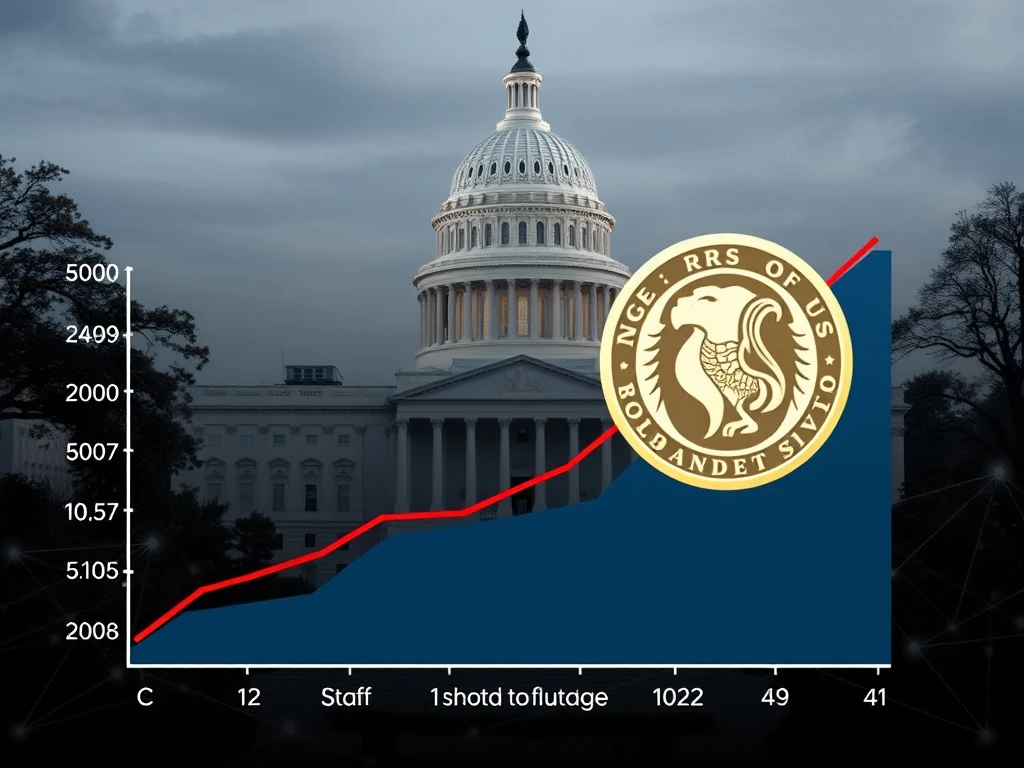SHOCKING IRS Staff Cuts: DOGE Proposes 20% Reduction Amidst Trump’s Tax Reform

Hold onto your hats, crypto enthusiasts and policy watchers! The Department of Government Efficiency (DOGE), spearheaded by none other than Elon Musk, is making waves again. This time, they’re setting their sights on the Internal Revenue Service (IRS) with a proposal that’s sure to ignite debate: slashing the IRS staff by a significant 20%. This move comes as part of a broader strategy to tackle the ballooning national debt and streamline government operations. But what does this mean for you, for crypto, and for the future of US governance? Let’s dive deep into this developing story.
Unpacking the DOGE Proposal for IRS Staff Cuts
According to reports, DOGE’s plan to implement IRS staff cuts aims to reduce the agency’s workforce by approximately 20% by May 15, 2025. This isn’t just a minor adjustment; it’s a substantial reduction that could impact thousands of employees. Sources suggest this cut would affect around 6,800 positions, adding to previous reductions including probationary employees and agents offered severance packages. Elon Musk, the driving force behind DOGE, claims that these government efficiency measures are crucial, citing the identification of over $500 billion in fraudulent spending within entitlement programs. This bold claim underscores the urgency DOGE feels in addressing fiscal responsibility.
Trump’s Tax Reform and the IRS Shake-Up
This proposed IRS staff cuts initiative is happening against the backdrop of President Trump’s ambitious plans for Trump tax reform. Trump has openly discussed radical changes, including potentially eliminating federal income tax altogether and relying solely on tariffs for federal funding. Such a drastic shift in tax policy would fundamentally alter the role and size of the IRS. Imagine a scenario where income tax, as we know it, vanishes. The IRS would need to adapt dramatically, and DOGE’s proposed staff reductions could be seen as a preemptive move in anticipation of such reforms.
President Trump’s tax reform ideas include:
- Potential elimination of federal income tax.
- Funding the federal government through tariffs on foreign goods.
- Aiming for significant tax savings for average Americans.
These proposals, while still in the discussion phase, signal a potential paradigm shift in how the US government is funded and how taxes are collected. The government efficiency drive, with IRS staff cuts at the forefront, appears to be aligning with this broader vision of fiscal overhaul.
Elon Musk’s DOGE: Beyond IRS Staff Cuts to Broader Efficiency
Elon Musk’s involvement through DOGE injects a tech-industry, efficiency-focused perspective into government operations. Beyond just IRS staff cuts, DOGE is exploring various strategies to combat the staggering $36 trillion US national debt. One particularly innovative idea is to put all public spending on the blockchain.
Here’s how blockchain could boost government efficiency:
- Transparency: Every transaction is recorded publicly, reducing opportunities for hidden spending and corruption.
- Reduced Deficits: Increased transparency and accountability can lead to more responsible spending and better resource allocation.
- Audit Trails: Blockchain provides an immutable audit trail, making it easier to track funds and identify inefficiencies.
While the concept of blockchain-based government spending is still nascent, it highlights DOGE’s commitment to leveraging technology for enhanced government efficiency and fiscal responsibility. The SEC’s recent move to cut regional office directors, while keeping offices open, further demonstrates a wider trend of cost-saving measures across federal agencies, potentially inspired by DOGE’s initiatives.
The Debate Rages: Savings vs. Service?
Not everyone is on board with DOGE’s approach. Senator Elizabeth Warren, a vocal critic of both Elon Musk and Donald Trump, has voiced strong opposition to these cost-cutting measures. Senator Warren argues for increased taxes and federal spending to improve government efficiency, a stark contrast to DOGE’s strategy of IRS staff cuts and fiscal austerity. This sets up a clear ideological clash: Is the path to government efficiency through reduced spending and staff, or through increased investment and potentially higher taxes?
Arguments against drastic IRS staff cuts often raise concerns about:
- Reduced Taxpayer Service: Fewer staff could lead to longer wait times, less assistance for taxpayers, and decreased audit capabilities in certain areas.
- Increased Tax Evasion: Critics argue that understaffing the IRS could make it harder to catch tax evaders, potentially offsetting any savings from staff reductions.
- Impact on Economy: Some economists worry that aggressive austerity measures could negatively impact economic growth.
Potential Upsides: Tax Savings and Stimulus?
Despite the controversies, proponents of DOGE’s plan point to potential benefits. Research suggests that Trump tax reform, specifically eliminating federal income tax, could save the average American a significant amount of money over their lifetime. These savings could be further amplified if state-level wage-based taxes are also repealed. Moreover, there’s been talk of passing on a portion of DOGE’s savings to Americans through stimulus checks or tax credits. This potential for direct financial benefit could be a powerful motivator for public support of these government efficiency measures.
The Road Ahead for IRS and Government Efficiency
The proposal for IRS staff cuts is still unfolding, and legal challenges could further complicate the situation. A recent court ruling ordering the reinstatement of probationary workers terminated under DOGE’s cost-cutting programs highlights the potential hurdles ahead. Whether this specific IRS staff cuts proposal succeeds or not, the broader conversation about government efficiency, national debt reduction, and potential Trump tax reform is undoubtedly gaining momentum. Elon Musk’s DOGE is forcing a critical examination of how the US government operates and spends taxpayer money. As the debate intensifies, the crypto community and the wider public will be keenly watching how these developments shape the future of American governance and fiscal policy.
Conclusion: A Bold Move or Fiscal Folly?
DOGE’s proposal to slash IRS staff by 20% is a shocking and ambitious move that reflects a broader push for government efficiency and fiscal responsibility. While the potential benefits of Trump tax reform and reduced national debt are enticing, the potential downsides, particularly regarding taxpayer service and the IRS’s ability to function effectively, are significant concerns. As this story develops, it’s crucial to consider all sides of the argument and understand the potential ramifications of such drastic changes. One thing is certain: the debate over the size and scope of government, fueled by figures like Elon Musk and policies like IRS staff cuts, is far from over.










